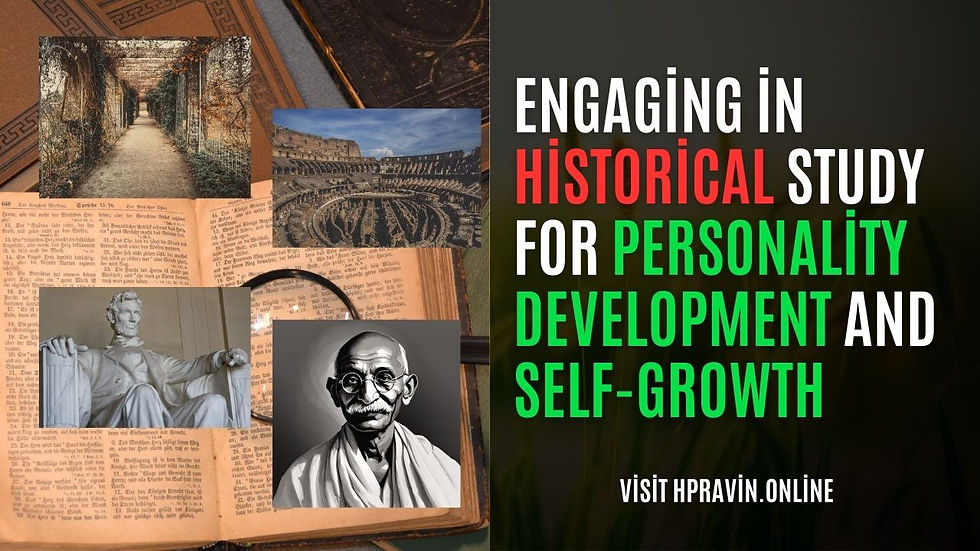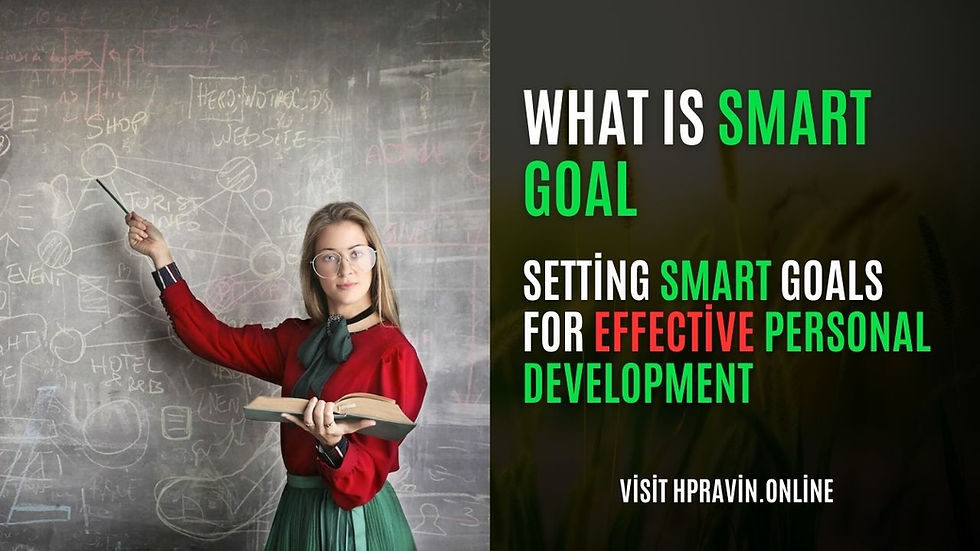Engaging in Historical Studies for Personality Development and Self-Growth
- Haobam Pravinsen

- Aug 5, 2024
- 6 min read

Engaging in Historical Studies for Personality Development and Self-Growth
History goes beyond mere dates and events; it represents a rich source of human experiences, choices, and outcomes that have influenced our world. Through the study of history, we can acquire deep understanding of human behavior, societal progress, individual development, personality development and self-growth. For young people and those interested in personal advancement, delving into history provides important teachings on leadership, perseverance, morals, and analytical thinking. This piece delves into the ways in which involvement in historical research can enhance personal growth and character development.
Learning from Great Leaders
Throughout history, influential leaders have shaped the world with their actions and decisions. Studying their lives reveals unique qualities like determination, strategic thinking, and inspiration. By examining their challenges and strategies, valuable lessons can be learned. Exploring their personal growth trajectories highlights the transformative power of experience and adversity, cultivating resilience and self-awareness. These leaders offer wisdom and inspiration, providing a roadmap for effective leadership and personal growth. By drawing upon their lessons, we can strive to become better leaders and individuals, equipped to navigate our paths to success.
Study of the Case of Mahatma Gandhi
The leadership of Mahatma Gandhi during India's fight for independence showcases bravery, non-violence, and ethical principles. Gandhi's focus on self-control and moral uprightness can motivate us to cultivate similar attributes in our personal lives. His skill in leading by demonstration rather than force educates us on the significance of guiding with compassion and comprehension.
Utilization
Self-Examination: Ponder on ways to integrate non-violence principles and ethical conduct into your everyday engagements.
Leadership Implementation: Implement leading through demonstration in team assignments or civic engagements, emphasizing empathy and honesty.
Understanding Human Resilience
Through historical research, we discover numerous accounts of resilience, demonstrating how people and communities have triumphed over challenges.
The Great Depression
During the 1930s, the Great Depression brought about significant economic challenges. Nonetheless, it also highlighted the strength and perseverance of both individuals and communities. They responded by acquiring new skills, offering mutual support, and devising creative strategies to endure.
Utilization
Adjusting to Change: Acquire new skills and reach out to your community for support to effectively cope with personal challenges.
Enhancing Resilience: Participate in activities that push your boundaries, like picking up a new language or taking on a challenging project through volunteering.
Gaining Ethical Perspectives
Studying history presents individuals with intricate ethical dilemmas, offering a unique opportunity to explore moral decision-making. By examining historical events and individuals' actions, one gains a deeper understanding of human behavior and the consequences of moral choices. This reflection encourages individuals to strengthen their moral compass and gain a nuanced understanding of ethics, fostering personal growth and moral development.
The Nuremberg Trials
The Nuremberg Trials following World War II dealt with atrocities against humanity and established guidelines for global legal standards. They underscored the significance of holding individuals accountable and ensuring justice, particularly in difficult circumstances.
Utilization
Historical case studies provide valuable insights into ethical decision-making by examining past scenarios and factors influencing tough choices. This enhances understanding of ethical implications, critical thinking, and decision-making skills.
Ethical Decision-Making: Analyzing historical case studies helps individuals simulate ethical decision-making processes, learning from successful and unsuccessful approaches to hone their own abilities.
Moral Contemplation: Reflecting on personal ethical dilemmas and comparing them to historical figures' actions fosters critical evaluation of values, principles, empathy, and broader perspectives across different time periods and cultural contexts.
Enhancing Empathy and Emotional Intelligence
Studying history enhances empathy and emotional intelligence by understanding past individuals' emotions, motivations, and actions. This leads to meaningful connections and effective communication, crucial for navigating social dynamics and resolving conflicts in the workplace.
The Civil Rights Movement
The Civil Rights Movement in the United States was a pivotal moment in history that aimed to dismantle systemic racism and segregation. Led by influential figures such as Martin Luther King Jr., Rosa Parks, and Malcolm X, this movement advocated for equal rights, justice, and opportunities for African Americans and other marginalized communities. By studying the Civil Rights Movement, we gain insight into the challenges faced by individuals who fought against discrimination and oppression. It allows us to comprehend the sacrifices made, the resilience shown, and the victories achieved in the pursuit of a more just and inclusive society. Through examining this movement, we can appreciate the power of grassroots activism, nonviolent resistance, and the importance of solidarity in creating lasting social change. The lessons learned from the Civil Rights Movement continue to inspire current and future generations to stand up against injustice and work towards a more equitable world for all.
Enhancing Empathy
Develop empathy through exercises like reading diverse historical accounts and volunteering with marginalized groups. Improve emotional intelligence by practicing active listening and empathetic communication for stronger relationships and a more compassionate environment.
Developing Critical Thinking Skills
Historical analysis requires evaluating sources, understanding context, and identifying bias, all of which enhance critical thinking skills.
The Cuban Missile Crisis
The Cuban Missile Crisis of 1962 was a pivotal moment in the Cold War. Analyzing the decisions of leaders like John F. Kennedy and Nikita Khrushchev can teach us about strategic thinking and crisis management.
Application
Critical Analysis: Practice analyzing historical events by examining primary and secondary sources, identifying bias, and understanding context.
Problem-Solving: Apply critical thinking skills to personal and professional challenges, using historical case studies as frameworks for decision-making.
Cultivating Adaptability
History shows how societies and individuals have adapted to change, offering valuable lessons in flexibility and openness.
The Industrial Revolution
The Industrial Revolution transformed economies and societies. Studying this period reveals how people adapted to technological advancements and shifting job markets.
Application
Flexibility Training: Develop adaptability by embracing new technologies and staying open to learning opportunities.
Continuous Learning: Engage in lifelong learning by taking courses, attending workshops, and reading extensively.

Building a Growth Mindset
Studying historical progress and innovation fosters a growth mindset, encouraging us to embrace learning and self-improvement.
The Renaissance
The Renaissance was a period of remarkable cultural, artistic, and scientific achievements. It exemplifies the power of curiosity, creativity, and the pursuit of knowledge.
Application
Creative Exploration: Cultivate a growth mindset by exploring new hobbies, such as painting, writing, or scientific experimentation.
Self-Improvement Goals: Set personal development goals inspired by historical figures' achievements and persistently work towards them.
Understanding the Impact of Personal Actions
History illustrates how individual actions can influence broader events, motivating us to act with intention and purpose.
Rosa Parks
Rosa Parks' refusal to give up her bus seat in 1955 sparked the Montgomery Bus Boycott and became a pivotal moment in the Civil Rights Movement. Her courage demonstrates the power of individual actions in driving social change.
Application
Intentional Living: Reflect on how your actions can positively impact your community and society.
Purpose-Driven Goals: Set and pursue goals that align with your values and contribute to the greater good.
Appreciating Cultural Heritage
Understanding our own cultural heritage and that of others strengthens our sense of identity and belonging, fundamental to personal development.
The Harlem Renaissance
The Harlem Renaissance was a cultural movement that celebrated African American cultural and artistic achievements. It fostered a sense of pride and identity among African Americans.
Application
Cultural Exploration: Explore your cultural heritage through family stories, traditions, and historical research.
Diversity Appreciation: Learn about and celebrate the cultural heritage of others, promoting diversity and inclusion in your community.
Fostering a Sense of Responsibility
Reflecting on our past actions is crucial for personal and societal growth. It helps us understand how our behavior affects the world, leading to a sense of responsibility and a desire to make positive contributions. By recognizing the consequences of our actions, we become more mindful and accountable, inspiring us to act in alignment with our values. Learning from our past can motivate us to engage in kindness and empathy, fostering a harmonious environment and encouraging others to do the same. Ultimately, this reflection process empowers individuals to take ownership of their impact and work towards a better future for all.
Environmental Movements
Environmental movements, such as the establishment of Earth Day in 1970, highlight the importance of taking responsibility for our planet. These movements have driven significant policy changes and increased environmental awareness.
Application
Sustainable Practices: Adopt sustainable practices in your daily life, such as reducing waste and conserving energy.
Community Involvement: Get involved in community initiatives that promote environmental sustainability and social justice.
Practical Uses for Young People and the General Public
Exploring history through Case Studies helps understand historical figures' characteristics, decision-making, and leadership. Role-Playing in historical scenarios fosters empathy, perspective-taking, and decision-making skills. Reflective Exercises connect historical events with personal dilemmas for self-awareness. Group Conversations on historical events enhance communication skills and promote diverse perspectives for a more empathetic society.
Conclusion
Participating in historical studies provides a wide range of valuable lessons that can greatly impact personal growth and development. Through studying great leaders, exploring human resilience, adopting ethical viewpoints, improving empathy, honing critical thinking abilities, fostering adaptability, nurturing a growth mindset, recognizing the consequences of individual actions, valuing cultural heritage, and embracing responsibility, we can utilize the knowledge from the past to mold a more resilient, ethical, and adaptable persona in the present.
History offers a valuable framework for young people and individuals looking to enhance their lives, helping them understand the intricacies of human behavior and societal progress. By incorporating historical knowledge into personal growth efforts, we can acquire the abilities and attributes needed to tackle the difficulties of contemporary society and make a positive impact on our communities and the world.
References you can you look up for more understanding...




Comments